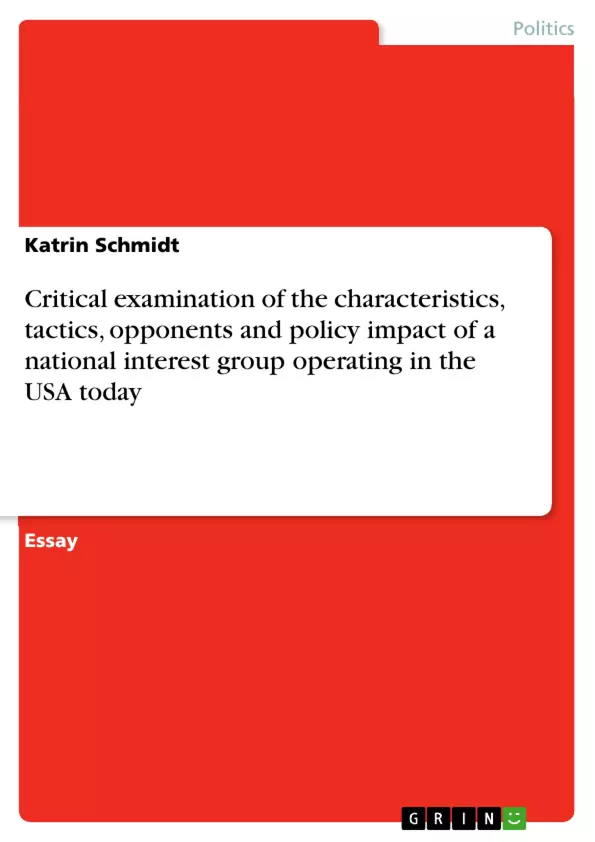In the United States of America (USA) which claims to be one of the most modern democracies, interest groups play an important role in its political culture. They represent diversity and have an important influence on policy making, which is enhanced through the relative weakness of the political parties. Instead of wide party ideologies, interest groups concentrate only on one special “interest”. The federalist system encourages interest groups because it offers multiple access points. Citizens come together on specific interests on local levels and then later expand with the help of the media and the Internet onto national levels. Additionally, the strong and independent judiciary enhances the power of interest groups (see website 1). Freedom of speech and freedom of the press guarantee interest groups the right to publish their interests according to their means.
Inhaltsverzeichnis (Table of Contents)
- The USA is one of the very few countries, which still allows the sanction of the death penalty in 38 of its 50 states by the US Military and the Federal Government.
- The death penalty has repeatedly been challenged as being a cruel and unusual punishment and thus unconstitutional under the Eighth Amendment to the US Constitution.
- The NCADP is a single-issue interest group with about 40 affiliates at Federal State level, 33 national affiliates, three international affiliates and further 345 coalition affiliates.
- Concerning the tactics of the NCADP, the interest group states on its website that it uses a number of non-violent methods to draw attention to, and advances its campaign against the death penalty at local, state and national levels.
- Information is, next to active and cohesive membership and money (mainly donations), the most important resource of interest groups.
- The abolition of the death penalty is a long-term aim with manifold approaches which concentrate on four core areas: Firstly legislative advocacy which implies working with policy-makers and their constituencies to adopt legislation in opposition to the death penalty at all levels.
- The major aim of the NCADP is to abolish the death penalty throughout the USA.
Zielsetzung und Themenschwerpunkte (Objectives and Key Themes)
This essay aims to critically examine the characteristics, tactics, opponents, and policy impact of the National Coalition to Abolish the Death Penalty (NCADP), a single-issue interest group operating in the United States of America (USA). The essay explores the role of interest groups in American politics and the NCADP's efforts to abolish the death penalty.
- The role of interest groups in US politics
- The history and objectives of the NCADP
- The tactics employed by the NCADP
- The opposition to the NCADP's goals
- The impact of the NCADP on policy and public opinion
Zusammenfassung der Kapitel (Chapter Summaries)
The essay begins by introducing the role of interest groups in the USA's political culture, highlighting their influence on policy making and the advantages of the federalist system for their operation. The essay then focuses on the NCADP, detailing its formation, objectives, and organizational structure.
The essay proceeds to explore the NCADP's tactics, emphasizing their use of non-violent methods, media advocacy, and grassroots organizing to advance their campaign against the death penalty. The essay also examines the NCADP's reliance on information, active membership, and financial donations.
The essay then delves into the NCADP's arguments against the death penalty, highlighting its violation of human rights, fallibility, and potential for executing innocent people. The essay also explores the NCADP's critique of the death penalty's disproportionate impact on ethnic minorities and the poor.
Schlüsselwörter (Keywords)
The primary keywords and focus topics of this essay include interest groups, the death penalty, the National Coalition to Abolish the Death Penalty (NCADP), human rights, legislative advocacy, media advocacy, grassroots advocacy, and the impact of the death penalty on ethnic minorities and the poor.
Frequently Asked Questions
What is the role of interest groups in US politics?
Interest groups represent diversity and influence policy-making, often filling the gap left by relatively weak political parties by focusing on specific issues.
What is the NCADP?
The National Coalition to Abolish the Death Penalty (NCADP) is a single-issue interest group dedicated to ending capital punishment in the United States.
What tactics does the NCADP use to achieve its goals?
The group uses non-violent methods, including legislative advocacy, media campaigns, and grassroots organizing at local, state, and national levels.
Why is the death penalty considered a human rights issue?
Opponents like the NCADP argue it is a cruel and unusual punishment, prone to errors, and disproportionately affects ethnic minorities and the poor.
How does the US federal system encourage interest groups?
The federalist system offers multiple access points at local, state, and national levels, allowing groups to influence various branches of government.
- Quote paper
- Katrin Schmidt (Author), 2006, Critical examination of the characteristics, tactics, opponents and policy impact of a national interest group operating in the USA today, Munich, GRIN Verlag, https://www.grin.com/document/94214



